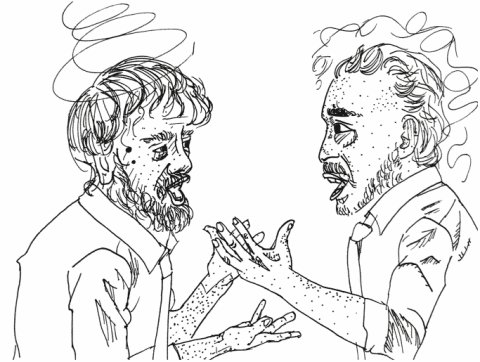
On April 19, Jordan Peterson and Slavoj Žižek — arguably the two primary public intellectuals of our generation — will hold a debate in Toronto. In advance of what’s sure to be an absolute shitshow, I hope this can serve as a watch guide.
For most people, this event will be of little interest, but to those who spend their days curating philosophy memes and pointing out ad hominems in Facebook comments, it’ll be entertaining at the least.
Peterson made his name as a professional “lib triggerer” after he spoke out against — and arguably mischaracterized — Bill C-16, a bill put forward by the Liberal government that codifed gender expression into the Canadian Charter of Rights and Freedoms. His vaguely philosophical self-help guide 12 Rules for Life: An Antidote for Chaos gained bestseller status despite his controversial views.
Žižek, a Slovenian Marxist, has spent years forging bizarre linkages between Lacanian psychoanalysis and Hegelian philosophy. He has produced extensive works in both print and flm that alternate between brilliant and confounding, making him one of the most wellknown modern philosophers in the Marxist tradition.
The topic being debated will be “Happiness: Capitalism v. Marxism.” The economic focus makes sense since the two philosophers both have generally reactionary social attitudes. So a debate on, say, political correctness or campus issues would end with both parties vigorously agreeing on everything before high fiving and calling it a day.
There are two major fault lines between Žižek and Peterson. The first being the aforementioned political disagreement between capitalism and socialism while the second is based in psychoanalysis. As a psychologist, Peterson advocates for the theories of Carl Jung while Žižek stands by famous French Freudian Jacques Lacan.
Peterson is an advocate of Jung’s theories of archetypes and the collective unconsciousness. This essentially amounts to a sincerely held belief that the human race shares a thought realm where idealized exemplars of human perfection — and countless other perfect objects — actually exist.
In contrast, Žižek presents a Lacanian analysis that theorizes that everything we perceive as real is actually a mixture of subjective fantasy and symbolic interpretation. Žižek has expanded this to a critique of society and ideology, using Lacan’s intermingling of the imaginary and the symbolic to study cultural movements, political systems and attitudes of prejudice.
Avoiding a social debate is probably best for everyone involved, and props to the event organizer for making that call. However, the debate topic chosen is not really suited to either philosopher. Peterson and Žižek both outwardly appear as monuments of human misery, and neither thinker’s world view leaves much room for happiness as a consideration.
Peterson is mostly concerned with hierarchy, duty and responsibility. He disregards a spiritual path to happiness, citing Christian doctrine as a useful rulebook for governing society and little else. His prescriptive life plan suggests happiness but focuses mainly on maintaining social order.
He often appears vindictive and wounded, claiming that a GQ interviewer who challenged him was “animus possessed from the Jungian perspective.” He repeatedly berates his detractors rather than coming up with an actual argument. Instead, he spends his time as a guest on The Joe Rogan Experience and hot-take generator, in lieu of, you know, actually doing philosophy.
He is also a staunch critic of Michel Foucault and the supposed philosophical movement of “post-modern neo-Marxism,” a label that really only exists in the space between Peterson’s ears. Ironically, Foucault was a critic of Marxism, whose analysis of power led him to advocate for the necessity of hierarchies as a condition for any productive society. Surprising literally no one, it turns out that the post-modernists don’t care much for modernity either.
Peterson isn’t much of a philosopher, but Žižek is hardly an ideal advocate for the left. While he is well-read in the Western canon of philosophy, his conclusions are often suspect. Žižek has advocated for bizarre and dangerous political solutions including a return to authoritarian communism, and more recently, an anti-capitalist revolution spearheaded by Bernie Sanders supporters and members of the alt-right.
Žižek is a fountain of insane word-association-style philosophical ideas, and he’s been called out for misreading his inspirations on multiple occasions. Watching Žižek talk can be fascinating, but there’s always a suspicion that most of what he’s saying is bullshit. He’s drawing connections that no one else is, but there might be a reason no one has.
I’m not sure how this debate will go, but it’ll probably be a farce on at least some level. I’m not much of a fan of either of the participants, but I hope, at the very least, this piece can serve as an introduction to the work of both philosophers for a more informed debate-viewing experience.
—
Cole Chretien / Culture Editor
Graphic: Samantha Langer
Leave a Reply